Can You Fry with Olive Oil? A Complete Guide
Can you fry with olive oil? Yes, yes you can. Let’s put an end to this myth once and for all. Not only can you fry with olive oil, but it is in fact one of the best and healthiest oils to fry and cook with. Let’s see what the research says.
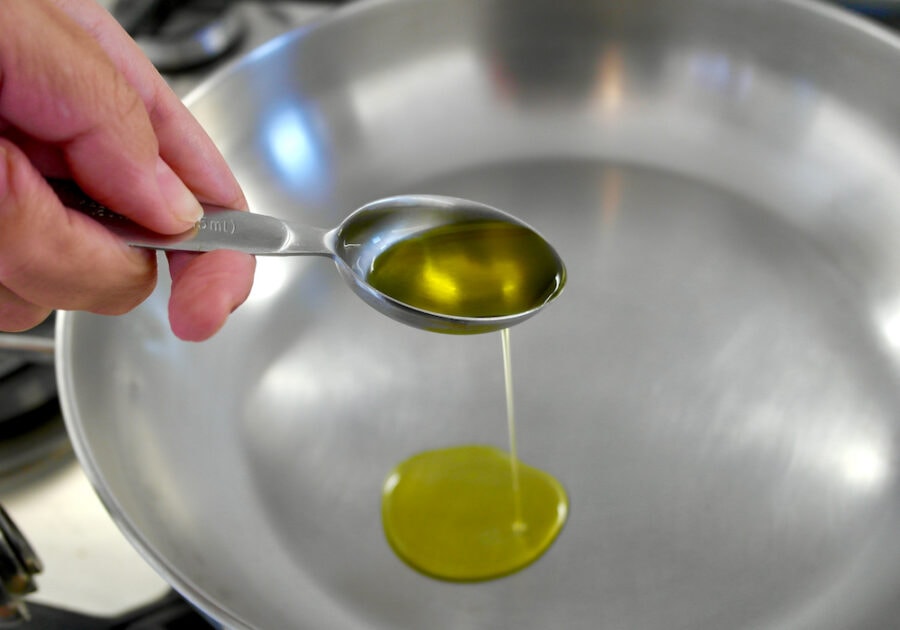
Is frying with olive oil healthy?
Yes, it is one of healthiest oils to fry with. Let’s look at the 2 issues that cause unneeded worry.
- You are worried olive oil once heated releases dangerous substances. Extra virgin olive oil contains antioxidants (other oils do not) so it is quite resistant to oxidation and there will be a less chance of the formation of harmful substances while cooking, compared to other oils. Frying with extra virgin olive oil is not carcinogenic.
- You have been told that olive oil has a low smoke point and therefore you should not fry with it. Nope, not true, see below.
What is the smoke point of an oil?
The smoke point of an oil is the moment when an oil that is heated stops shimmering and begins to “burn” and release smoke. In this case it may release a substance called acrolein, this can potentially be cancerogenic, but this will most likely be an issue if you are continually frying and heating oils above their smoke point and breathing in the smoke, which if you are a home cook who doesn’t burn their food, this will not happen. Generally, we worry about an oil reaching its smoke point because it will give a burnt, bitter taste to the food you are frying.
Ok, so now that you know what smoke point is, you may have read that it is better to fry with certain seed or vegetables oils or refined olive oils (AKA highly processed olive oil that has no nutritional value) because they have higher smoke points. The truth is that extra virgin olive oil has a higher smoke point than many refined olive oils, it also contains the polyphenols that reduce the rate of oxidation. In fact, it is the most stable oil when heated. The smoke point for extra virgin olive oil ranges from 365 to 410 degrees Fahrenheit. That means that it is just fine to use for frying and sauteing as you would not reach the smoke point on a stovetop oven.
However, I need to add that the smoke point is not the best predictor of stability of an oil when heated according to a recent study. The researchers found that oxidative stability, total level of polyunsaturated fats and processing is what affects the performance of an oil when it is heated.
Frying with Extra Virgin Olive Oil is the Healthiest
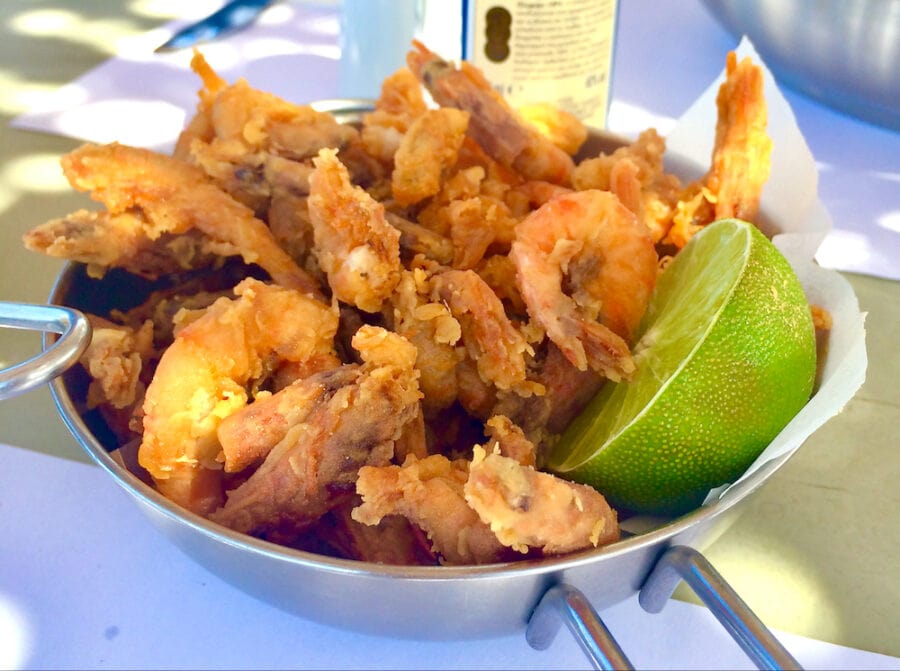
Now that you know that it is fine to fry with extra virgin olive oil, let’s see why it is the healthiest option.
- Extra virgin olive oil is a stable oil when heated due to the antioxidants it contains and minimal processing. When heated studies have found that it produced the least number of polar compounds (harmful byproducts) compared to other common oils (canola, sunflower, avocado, peanut etc.).
- Extra virgin olive oil retains significant amounts of polyphenols and antioxidants when heated. Other oils do not even contain any antioxidants.
- The antioxidants and polyphenols from extra virgin olive oil are transferred to the foods that are fried in it. This increases the nutrients in the food you are frying.
Best Tips for Frying with Olive Oil
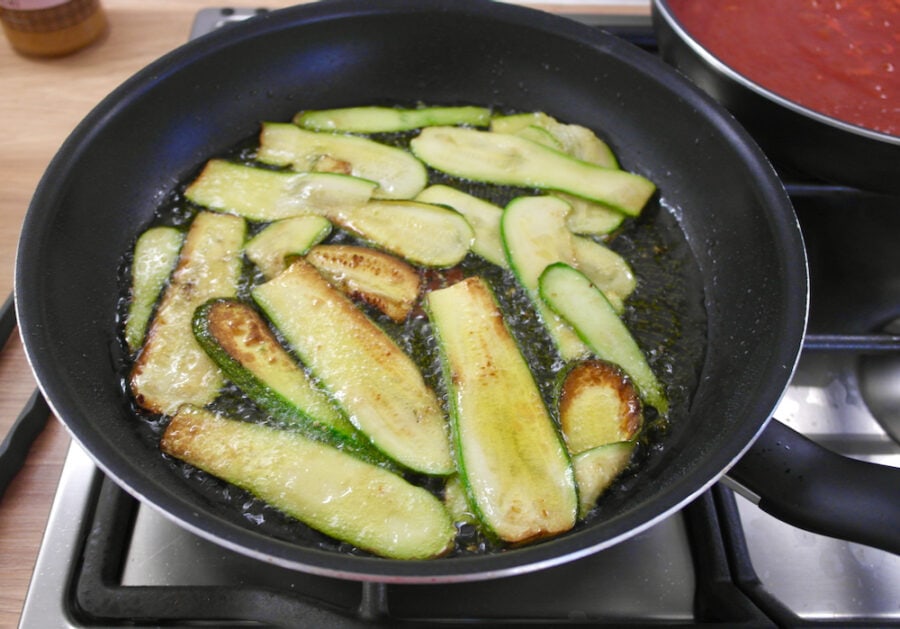
Many cooks and chefs will tell you that frying needs skill. The same goes for frying in olive oil. Here are the best tips to fry with olive oil and produce healthy and delicious food.
- This is probably the most important point. Do not extensively re-use olive oil, at most 3 times. To re-use it, it must not have exceeded 350 F (180 C). This is important for 2 reasons: health benefits, the more the oil is heated the more it loses its benefits. Flavorwise it will affect the taste of your food.
- Make sure the olive oil is at the right temperature; too hot and you will quickly fry the outside while the inside is uncooked, too cold and the food will absorb too much olive oil and become soggy and heavy. Ι generally wait until the temperature of olive oil reaches 330 F.
- Place your fried items on paper towels to soak up any extra oil.
- Serve immediately, fried foods get soft after a while.
Want More Mediterranean Diet Guidance? Get my top-rated book!
Click Here >> The Mediterranean Diet Cookbook for Beginners
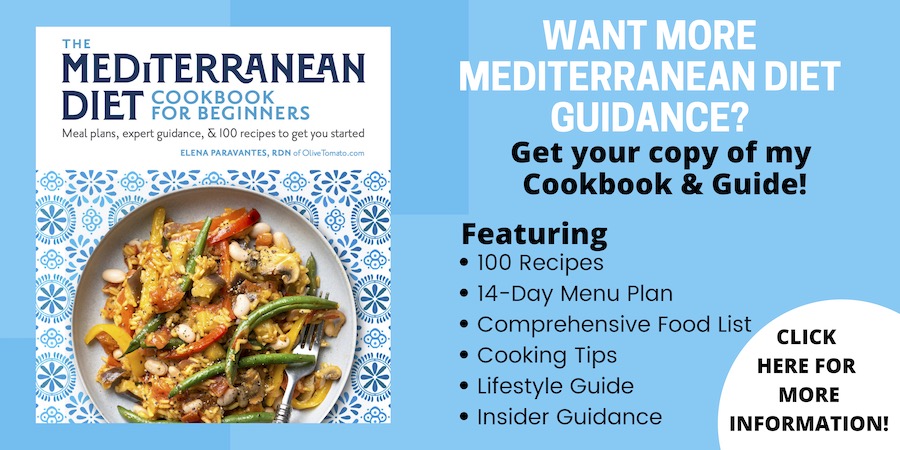
Frying and the Mediterranean Diet
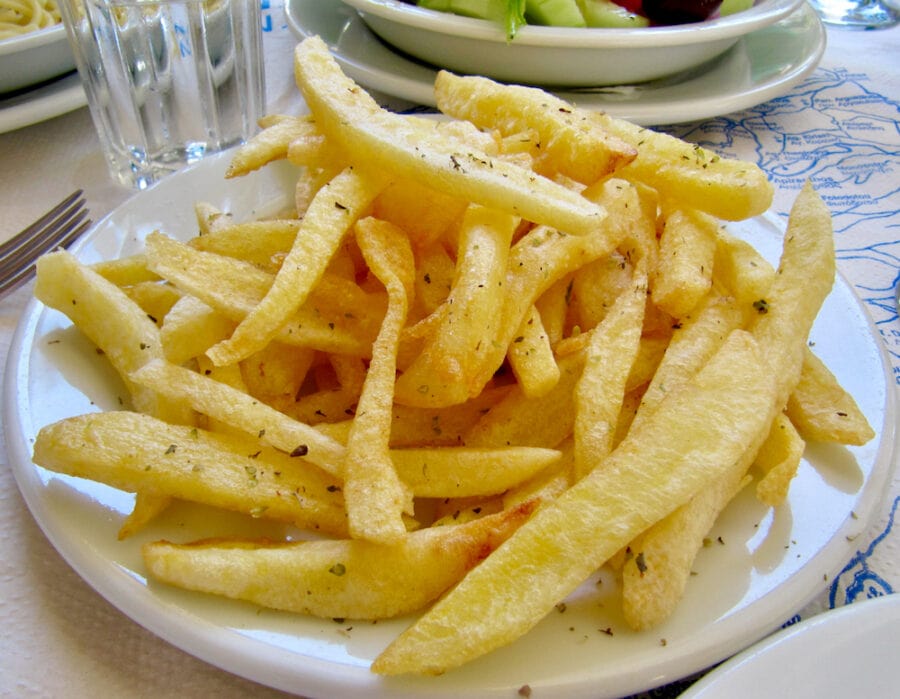
As everybody knows by now, the Mediterranean diet is considered one of the best (if not the best) diet in terms of longevity and protection from chronic disease. What is often lost in all this information is the fact that the authentic Mediterranean diet that was studied so many years ago and is associated with long lives, does include some fried foods, and those foods were fried in olive oil (there was no canola oil available in those areas at that time).
Research has shown that the moderate consumption of fried foods did not have any effect on heart health if those foods were fried in fresh olive oil and a Mediterranean diet was followed.
Take Home Message
So, should you fry?
The key word here is the word moderate. You shouldn’t be eating fried food every day, but if you do decide to eat fried food, make sure it is fried in olive oil. Within the Mediterranean diet, fried food is consumed occasionally but mostly in small amounts and usually as an appetizer, examples include fried calamari, or zucchini fritters, olive oil fries-these dishes are shared so each person just a few. And the frying is usually a shallow pan fry, not deep fried. And avoid fried food from restaurants. Restaurants generally will use other oils for frying because it is cheaper, not because it is better.
Recipe Ideas Using Olive Oil
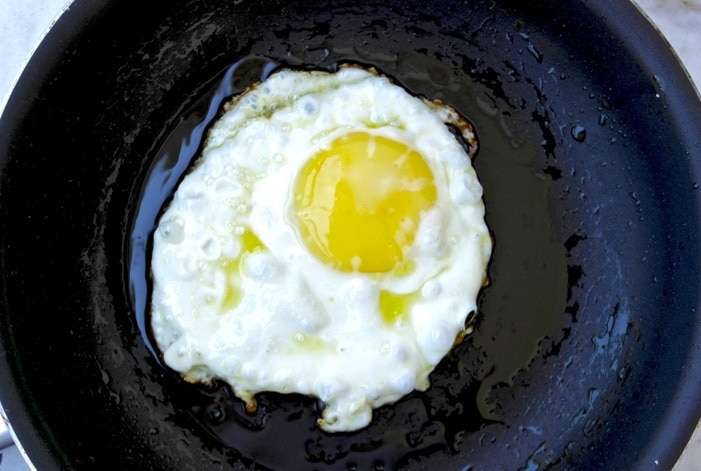
- Greek Zucchini Fritters with Feta and Herbs – Kolokithokeftedes
- How to Fry an Egg with Olive Oil
- Authentic Greek Olive Oil Fries – Patates Tiganites
More Olive Oil Resources
- How to Buy The Best Olive Oil
- 5 Facts You May Not Know About Olive Oil
- 7 Delicious Ways to Use Olive Oil
- How to Recognize Good and Bad Olive Oil
Sources
- Consumption of fried foods and risk of coronary heart disease: Spanish cohort of the European Prospective Investigation into Cancer and Nutrition study
- Domestic Sautéing with EVOO: Change in the Phenolic Profile
- Phenols and the antioxidant capacity of Mediterranean vegetables prepared with extra virgin olive oil using different domestic cooking techniques
- Evaluation of Chemical and Physical Changes in Different Commercial Oils during Heating

Great article! It’s refreshing to see a well-researched and informative post debunking the myths surrounding frying with olive oil. I appreciate the in-depth explanation of smoke points and the stability of extra virgin olive oil when heated. It’s wonderful to learn that not only is it safe to fry with olive oil, but it’s also a healthier option due to its antioxidants and polyphenols. The tips provided for frying with olive oil are really helpful, and I’ll be sure to keep them in mind next time I cook. Thanks for sharing this valuable information!
Thank you for clearing this up! I’ve been frying fish in good olive oil for years. I also fry zucchini and eggplant in olive oil. Sooooooo delicious! We don’t eat these fried foods often, but when we do, we really enjoy them. Fresh squid, dipped in a bit of flour and fried in good olive oil is probably the most delicious food on the planet! I have never understood the olive oil naysayers.
I love this article so much. I never deep fry but do cook my veggies in about a teaspoon of olive oil and sometimes roast veggies with oil and I’ve been worried.
Question though, you say not to fry food to often. Is cooking some veggies in the pan with a teaspoon of oil considered frying or is that sauteing? Never understood the difference and if it is different, if sauteing frequently is okay.
Love the site. Thank you for the clear and concise clarification!
Thank you Willow. Yes, the sauteing of onion which is often the first step inmost Mediterranean cooked dishes, is not considered frying in the sense that I was talking about in the article. Great question!
Curious about why you stated use use of evoo only for frying. Why not the cheaper olive oil for a simple pan fry. I rarely fry but would like to know the difference.
Hi Joanne. In the beginning of the article I mention that plain olive oil is quite refined and does not contain the antioxidants and polyphenols that extra virgin olive oil contains. Because of that extra virgin olive oil is more stable when heated.
Hi Elena, great article! Thankful for this info. Do you mind sharing some of resources/studies you alluded to in the article? I want to dig in a little deeper on the subject.
Thank you Lindsay! They are listed under “sources” at the ended of the post.